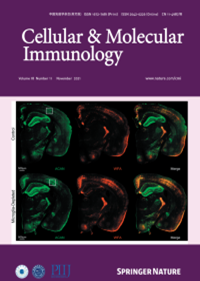Neutrophils in cancer: from biology to therapy
IF 21.8
1区 医学
Q1 IMMUNOLOGY
引用次数: 0
Abstract
The view of neutrophils has shifted from simple phagocytic cells, whose main function is to kill pathogens, to very complex cells that are also involved in immune regulation and tissue repair. These cells are essential for maintaining and regaining tissue homeostasis. Neutrophils can be viewed as double-edged swords in a range of situations. The potent killing machinery necessary for immune responses to pathogens can easily lead to collateral damage to host tissues when inappropriately controlled. Furthermore, some subtypes of neutrophils are potent pathogen killers, whereas others are immunosuppressive or can aid in tissue healing. Finally, in tumor immunology, many examples of both protumorigenic and antitumorigenic properties of neutrophils have been described. This has important consequences for cancer therapy, as targeting neutrophils can lead to either suppressed or stimulated antitumor responses. This review will discuss the current knowledge regarding the pro- and antitumorigenic roles of neutrophils, leading to the concept of a confused state of neutrophil-driven pro-/antitumor responses.

中性粒细胞在癌症中的作用:从生物学到治疗。
中性粒细胞的观点已经从简单的吞噬细胞(其主要功能是杀死病原体)转变为非常复杂的细胞(也参与免疫调节和组织修复)。这些细胞对于维持和恢复组织稳态至关重要。中性粒细胞在许多情况下可被视为双刃剑。当控制不当时,免疫应答病原体所必需的强大杀伤机制很容易导致宿主组织的附带损伤。此外,一些亚型的中性粒细胞是有效的病原体杀手,而其他的则是免疫抑制或可以帮助组织愈合。最后,在肿瘤免疫学中,中性粒细胞的致瘤性和抗致瘤性的许多例子已经被描述。这对癌症治疗具有重要意义,因为靶向中性粒细胞可导致抑制或刺激抗肿瘤反应。这篇综述将讨论目前关于中性粒细胞的促肿瘤和抗肿瘤作用的知识,导致中性粒细胞驱动的促肿瘤/抗肿瘤反应的混乱状态的概念。
本文章由计算机程序翻译,如有差异,请以英文原文为准。
求助全文
约1分钟内获得全文
求助全文
来源期刊
CiteScore
31.20
自引率
1.20%
发文量
903
审稿时长
1 months
期刊介绍:
Cellular & Molecular Immunology, a monthly journal from the Chinese Society of Immunology and the University of Science and Technology of China, serves as a comprehensive platform covering both basic immunology research and clinical applications. The journal publishes a variety of article types, including Articles, Review Articles, Mini Reviews, and Short Communications, focusing on diverse aspects of cellular and molecular immunology.

 求助内容:
求助内容: 应助结果提醒方式:
应助结果提醒方式:


